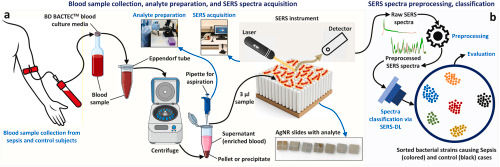Rapid detection of SARS-CoV-2 RNA in human nasopharyngeal specimens using SERS and Deep Learning
- Yiping Zhao
- Jan 1, 2023
- 1 min read
Recently we published a rapid SARS-CoV-2 detection paper based on surface enhanced Raman scattering spectroscopy (SERS) and deep learning in ACS Sensors. The paper is entitled "Rapid Detection of SARS-CoV-2 RNA in Human Nasopharyngeal Specimens Using Surface-Enhanced Raman Spectroscopy and Deep Learning Algorithms".
The SERS sensor was prepared using a silver nanorod array (AgNR) substrate by assembling DNA probes to capture SARS-CoV-2 RNA. The SERS spectra of HNS specimens were collected after RNA hybridization, and the corresponding SERS peaks were identified. The RNA detection range was determined to be 10^3–10^9 copies/mL in saline sodium citrate buffer. A recurrent neural network (RNN)-based deep learning model was developed to classify 40 positive and 120 negative specimens with an overall accuracy of 98.9%. For the blind test of 72 specimens, the RNN model gave a 97.2% accuracy prediction for positive specimens and a 100% accuracy for negative specimens. All the detections were performed in 25 min. These results suggest that the DNA-functionalized AgNR array SERS sensor combined with a deep learning algorithm could serve as a potential rapid point-of-care COVID-19 diagnostic platform.






Comments